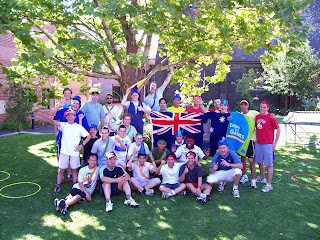Epiphany of the Lord
St. Andrew’s Parish
January 6-7, 2007
Introduction before Mass
Today is the Solemnity of the Epiphany of the Lord. The word “epiphany” comes from the Greek word epiphaneia that means “manifestation or revelation.” The Child born in the night of Bethlehem is manifested to the world as the light of salvation for all peoples.
We will hear from the Gospel a narration of the three Magi who came to from the East, adored the Child Jesus and offered him symbolic gifts: gold, incense, and myrrh. They were the first ones who witnessed the epiphany or manifestation of God’s revelation in the Child Jesus.
As we come to celebrate together on this Mass let us remember that we are here to adore the Lord with great joy. Like the Three Magi we have our own journey, we are looking for enlightenment, we are searching for answer, we are longing for happiness.
Let us now our present ourselves to the Child Jesus…
HomilyEpiphany Sunday in some countries is also called “Three Kings Sunday.” The Three Kings or Magi according to the Bible journeyed from the East following the Big Star leading to the place where the child Jesus is born, so they could worship him.
As I was preparing my homily yesterday afternoon the children song “Twinkle, Twinkle Little Star” was playing on my mind. It was because last Monday I went to my sister’s place to attend my nephew’s 3rd birthday party. I was there singing some children songs on a karaoke with my young niece and nephew. You know it is very typical for a Filipino family to have a karaoke at home. One of their favourite songs was “Twinkle, Twinkle” so it stuck into my mind until today.
I can imagine the Three Kings singing “Twinkle, Twinkle” as they ride on camel but with different words: “Twinkle, twinkle Big Star. How I wonder what you are.” Of course, this can’t be true, it’s only my childish imagination, however one thing is certain, the child Jesus whom the Three Kings were looking is more than a shining Star.
The child Jesus is God’s “epiphany” he is God’s manifestation who lights up the darkness of the world. As prophet Isaiah suggests in the first reading: See, darkness covers the earth, and thick clouds cover the people; but upon you the Lord shines, and over you appears his glory.
Epiphany Sunday is also known as the “second Christmas.” Our brothers and sisters from the Eastern Church, in line with the Julian Calendar, are celebrating Christmas this Sunday. We, who are in the Western Church ends Christmas season after the Baptism of the Lord, which is on Monday, however, we still observe the real message of Christmas: the ‘shining forth” or revelation of God to humankind in human form in the person of Jesus.
The Gospel reading we have this Sunday has many symbolisms.
The Three Kings or the three Magi, traditionally named
Gaspar,
Melchior and
Balthasar represent the Gentile world or non-believers. They were looking for the King of the Jews. Although they were not Jews, they must have felt they belonged somehow to his kingdom, too. “We have come to do him homage,” they said. They did not care if they were foreigners, strangers, pagans from the East. They are pagans but they are also members of God’s children.
Being the first ones to receive the news of the birth of Christ, they signify that the coming of the child Jesus in the world is not only for a particular group of people but for the whole human race. As the second reading tells us, “the pagans now share the same inheritance” of God’s salvation. The birth of Christ is God’s gift of salvation for Gentiles or Jews, and for all people.
The importance of the three Wise Men in our faith as Christians is not only their perseverance to pursue relentlessly the “Twinkle, Twinkle Big Star” that led them to the Child Jesus. But more than their patience and stamina, it is their act of homage and respect to the child Jesus that we need to follow. They recognise the Child as the newborn Messiah king, prostrate themselves, do him homage.
The three Magi expressed their act of worship to the baby Jesus by bringing him special gifts: gold, frankincense and myrrh. These three precious gifts brought by the Three Kings tell us something about the life and ministry of the Child Jesus: Gold is for the King; incense as an offering/sacrfice to God; and myrrh a symbol Christ’s future death but will gain victory over death.
And also in the Gospel story today, we have King Herod, a figure of someone who cannot accept the Child Jesus as the King of World. King Herod who in the beginning pretended to be a “Christ friendly” politician, ended up trying to kill the Christ-child. He will do everything for his love for power. He will compete directly with God in order to stay in power. He doesn’t want to see the glory of God’s manifestation. He doesn’t want God to be part of his life for he is full of pride.
So let ask ourselves, can we see ourselves like the Three Kings, persevering enough on our life’s journey? What gifts can we offer to the Child Jesus? Are we sometimes like King Herod who instead of welcoming Christ’s values we prefer to accept what the world tells us?
Prayer
Christ, Help us now to come to you, We want to walk in your light and rest in your warmth. Please keep us on the right road, heading toward your radiance, bringing our treasures, our assets, our gold, frankincense and myrrh, of our hearts.Christ, be born again and again in us. Be the gift we bear, the treasure inour hearts.
Amen.



























